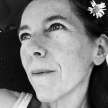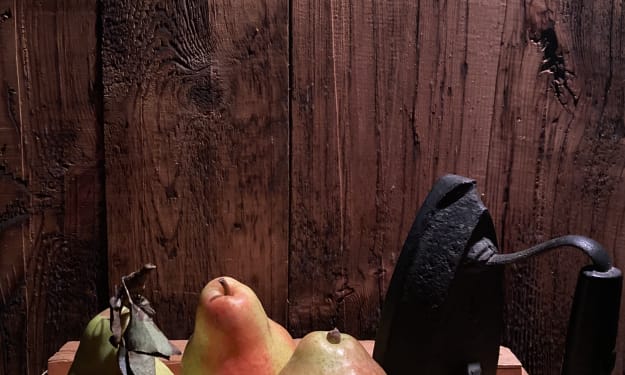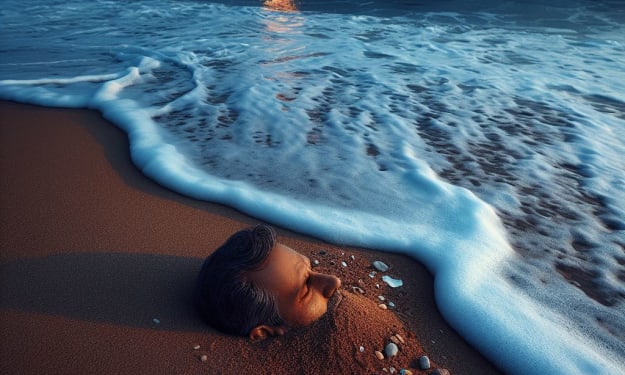
Take a picture of. It doesn't matter: it's the spirit of the action that counts. He takes the picture. At first, he feels guilty of trespassing; he's about to go. But farms here are big and the owners never see. Toni hill, cranky tree; it's hard to find nature's sitcoms. Takes time, plotting, meditation. Bill appreciated meditation: that is what he sought when he fled in panic. And he left with his eyes wits chattering in the film box of his camera.
Bill Bowing was a freeloader; he did not live up to his businesslike name. His best pal, Jim Angle, made a large enough salary that he split with bill; they had done that since college. Bill's wife and his friend Jim were partial to Bill, otherwise he had no right to exist, and they both knew it.
Bill cried every night. Soon life grew unbearable as his escapes grew pointless, pointless because the pictures he took there didn't come out. Completely blank. The FBI got them. The field, the cows. Because the last pictures he took on vacation, the ones that had disappointed him so much, were of the future and that wasn't right. That's the only explanation Bill could think of.
And so Bill kept looking at that last batch of pictures over and over, having come to a dead end in the only direction his ambition would seem to take. He sulked over his last most failed efforts as they continued to tell Bill how he would fail in the future.
Bill Bowing had a philosophy called No Blame. Meaning, that in life he was generous enough not to ask certain questions, like, how much do you give? Or, How do you stand up against thousands of over heated standards held in America, or certain religions, of me?
Bill asked himself all these questions, always concluding that they shouldn't be asked. Measuring up should not be an issue. Life's too mysterious; it's not as simple as comparing one set to another. Different noses had different circumstances.
His wife, C.C. Bowing, did not approve. He should realize he isn't normal, she thought; he should pay formalities through the nose like everybody else. But when it came right down to it, she wasn't loyal to her standards; on some level, she agreed with Bill, as all people who like each other agree not to blame. So whichever reality was, imperfection and fault, or lyrics, fate and integrity, the practical necessities of love would leave the first reality, the one we anticipate and torture ourselves with our worst fears and finally death, unpartaken.
Bill did not really look at all the pictures at once. He took out six and looked at them first. The pictures were all of a neighborhood, a neighborhood he knew but had never been to. He anticipated the scenes as if he were responsible for them.
In the first picture there was a modest white church that was sunk into the
ground. The front doors were under ground; the whole building tilted so that the steeple pointed, not to God, or maybe to God, but not up. And up, he thought and considered, is a neutral area, and now that steeple pointed as if to blame, pointed not simply to claim God but to point him out, give away his whereabouts and identify him, to hold him responsible.
The pictures were of a small town and there were small churches at almost every corner, because of the variety of religions people felt was their right to chose between. Every church had been affected by some storm. The condition of the churches reminded one of the condition of trees after a tornado or electrical storm; the look of uprooted ness, wrong angles, suffering and the thought of rebuilding.
But the trees around the churches all seemed fine. There had been a storm and the laws of consequence had been changed. The trees were not weak and splintered; the old brick churches were not strong. The fragile living trees did not need our sympathy; it was the huge symbols, the monument man made that were the victims. These were the first six photographs.
Bill is questionable, his judgment hysterical. No one knows what the future will be like, so it would be hard to know if you had ever caught a glimpse of it or not. There must be a better more complicated explanation. But, the again, they are Bill's pictures; it is his responsibility to explain them. He says they are pictures of the future, but what does he mean by that? Will there actually be a storm in which churches sink in the future, or are the pictures just a vague indication of monumental failure?
When Bill got out the whole stack of pictures, he found most of the rest boring. Until he came to a picture of Jim Angle drowning.
What a great shot, he thought; he really looks like he wants to communicate with those big red lips. The color was great, the bottom of the pool painted bright sky blue. Bill did not know in what way these pictures represented the future. Somehow he knew they were his pictures, that he hadn't by accident, gotten someone else's pictures. He had a maternal feeling about these pictures, that was clear.
He knew they were his because he decided he loved them and he was going to protect them by becoming a great interpreter, and a skilled translator.
Jim Angle drowning. Jim Angle drowning. Beautiful, his black curly hair looked like Medusa. He's happy, he's rich, he's beautiful, but he's in a situation over his head, out of control; he reaps too much. When I look into the water I'm happy for him, but he calls for help. He is glorified but not free.
The condition of the churches that must represent me. I'm the only one who worries about the condition of pointed white buildings in his sleep. My spiritual house is sinking That's not bad or corrupt, though it's haunting, shattering, depressing; it's a sign of weakness, therefore a sign of truth and hope of some new progress. And a miracle has happened, like a handshake with the good wills of the dead. Life is a puzzle that is very easy to figure out because there are so few pieces, and it is easy to see that they cannot fit together. It is only there to provoke the desires and imaginations of men, women, children and who knows what else. To achieve greatness has to do with desire, good will and imagination, and achieving greatness is essential because that is the only realm where God can exist; far from ignorance and isolation.
Achieving greatness is essential.
God’s mercy is for those who have already escaped, for those from whom God can't hide, because God is attracted to what they've created. What has happened is not natural; nature kills the weak, it does not kill the strong. Nature kills by the rule; God kills by discretion.
In the picture the trees survive and the churches sink. Structures are strong but life is weak. Lameness of the strong benefits the weak, and all live happily. The structure of the church will no longer guide the spirit. They will both live to make amends and be happy. What may seem unsuitable will be charming to all involved.
Looking at the pictures, I become knowing about everything in the pictures, and the knowledge leaves me in fear. People will not realize how trivial their principals are. They will see a change in the meaning of a monument they founded; it will appear fallen and they will be depressed.
They will see no further than this, they will not know why this has happened, they will not know they've been freed, they will only think they've been destroyed. They will set out to rebuild the church.
The progress of a few is destroyed by the rest when they fail to recognize a miracle, the resulting ties of a voice sent out. One person is dependent on the world. One person does not possess his world. His world flies out of him, and his imagination is as vulnerable as anything real. And from the moment of their precious birth, products of the imagination must make peace with the world or die.
Bill did not look at the other pictures. They came to him in dream, black and white photos of him and C.C. in Los Angeles. The others were of outer space. Bill stopped taking the course of action he had planned to take when he was suddenly interrupted by a new idea: suicide.
Creeping up on Bill were the facts that he was hopeless and in life he was powerless. There was nothing he could do; he was surrounded with consequences. And so the thought of suicide was a great relief. It was something he could do. It was a hope of change, change by his own hand. So he thought how he would do it and what he would do in the weeks before, and how he would have his body disposed of. He took pleasure in making these plans. He would like to jump from a window, but didn't want his mutilated body in the streets. All right a cliff then. But still the body would be messed up. He thought that might be important, the condition in which one passed.
He thought of consulting different religions. Mostly before dying he wanted to buy presents and visit friends, then last, he would spend time with C.C..
Then he realized he couldn't do it. If he cut out of life and left her there, he'd feel he'd left the job half done. Part of him would still be there.
His head fell on his desk with his notebook and his pictures. He heard C.C. come up the stairs. She stood at the open door of their room. He looked up.
"Never mind," she said, "Keep working."
"I'm in no hurry," he said, "I have the rest of my life to finish this. And I don't think it really matters if I do finish, say, if I die and it's left undone. It won't make any difference. It will be just like not finishing dinner."
I don't understand the willingness in people to go on living no matter what happens. I do not give life that absolute value. Life itself has no value; it is what is attached to life, or those things that come by the way of life, that save life, that keep it afloat. In fact, it personally hurts my feelings that people will give up everything that is meaningful and keep life no matter what life takes away. I see evidence here that I will go straight to hell, but I also know that God is wrong and I'm not going to put up with it. Why are we taught to surrender?
The future. Bill thought. He slept in bed. He had a family and he hated life. But he stopped banging his head against the wall. It his mind the plan was defeated. In his mind the hand was defeated. The defeat was in his hands. The future was his, his concern as much as a carrot in front of a rabbit's nose pulling a snow sled. The most future is death. And those who are living are very jealous of death.
Bill had an interest. Then he realized that if he were to die this week he wouldn't have much of an interest in knowing about death. He would probably not think about it. He would be busy stuffing all his time into life. It was only because he imagined having enough time to live that he worried about death. His mind was in luxury time and his worries were jumbo.
Meanwhile, there were these mornings. He didn't know how to face them, this one or the next one. I'm sinking, he thought, I'm sinking. Also he kept forgetting the real tragedy, the reason he thought about how he might worry if he only had a week to live.
It was because his friend Jim Angle only had a week to live. Jim was sinking, and he felt he was sinking too.
Jim and I had always been friends, he thought. But I don't know if he knew I liked him or if he understood what I was doing. Jim was in good spirits, better spirits than me. He was trying to stuff all his time into the rest of his life. That was his concern; not death. He was afraid of being cheated by life, not death. I never thought about how I would deal with the loss of Jim Angle. I thought about mornings, what the next morning would be like. What possibilities and obligations would be there, if there was any way I could try to get what I want. Possibilities were weak. I didn't know what to do, I couldn't think of a plan. I dreaded every morning I could imagine.
It was the little space after a late dinner, when basically you prepare to sleep, and if in the morning you know you will have to wake up quickly, then you prepare a little plan for the day.
Bill knew he would have to wake up quickly. The alarm would go off, C.C. would take a shower, and in a little while she would have to go; he would have to wake up if he ever wanted to see her again. So in the little space after a late dinner, he drank a lot, because he did not have a plan, and so by drinking he skipped over the little space where he was supposed to have made decisions and thereby got through the small, agonizing void.
Bill left his wife and went to California where he found himself, as if by a will of his own, raising grapes and making wine. The wines did not always come out well. They tended to be unpredictable in color, sometimes very bitter; some made you cry. Bill worried, but he never worried about the right things. And so one of the things he liked to do when he approached worry was to walk, in places, under cliffs, near the ocean. On his walk he picked up anything that interested him and put it in his bag.
Later, he grouped the things in ways that made sense to him, and he would have bottles and jars and things ready, and he would put the groups within the jars, and sometimes it stank years later. Most of the wines were beautiful, smelly and not fit to drink.
On a very hot day, he put some of the bottles in a basket and he took them to the beach, and poured the liquid out on a very hot stone. It evaporated noisily and turned into a heavenly steam; it smelled like something that could only have been smelt if he were a hummingbird. And in the cloud he heard voices.
He became the subject of cosmic gratitude. Bill was not a good person, a conscientious person, and I don't know if he had any sense of responsibility. He had a well of knowledge, and he was frustrated by that knowledge and did not know what to do with it. But he struck a nerve in outer space because he had a knack for discovering those kind of things. And the cosmos were grateful because whatever is mysterious is also deprived.
And so some combination of deity of the ocean and the wine and the objects on the beach began showering him with gifts.
At least that's where Bill believed the gifts were coming from. It seemed obvious to Bill, who found the gifts on the beach at the steaming rock. The gifts were hard to understand, like, if it was an instrument or a game or a puzzle or just something beautiful, was hard to tell. But they gave clues and Bill has some of them figured out, he thinks.
He learned a lot through the gifts. One day he went to the rock and there was a map. It was a test, he guessed; he drew on it and left it there. And the wines told him that he passed, that he was an alien. So he passed out and didn't wake up for a long time.
When he did wake up, he went to have breakfast, on the breakfast table was a round bowl of warm water. In the water rocked a round shell, and inside the round shell was a little baby.
Bill called his wife and asked her about it. She was very excited. He asked what she had been doing and she said that she had been pulling down the shades in the house, and that she had vandalized some churches.
That night, Bill went home to his wife, who was now younger than he was, and he brought the baby and they were very sad for a while because so much time had passed.
And Bill went to take pictures of Jim Angles grave. He watched the Polaroid developing and thought, that'll show the FBI, and fields of blue appeared and instead of a grave there was a redhead, and the shadows of dark blue children were playing in the fields. Jim was always so photogenic, even when he was drowning, even when he was dead.
About the Creator
Alice Eckles
artist, writer, being
I’m interested in life, nature, art, books, joy, beauty, doing stuff and refreshment.
Art portfolio at www.AliceEcklesStudio.com
Daily paintings available at www.AliceEcklesArt.com
@aliceecklesstudio on Instagram






Comments
There are no comments for this story
Be the first to respond and start the conversation.